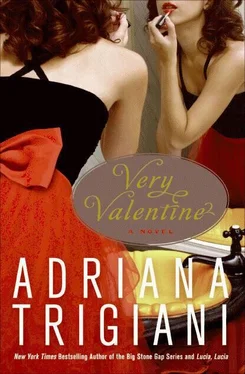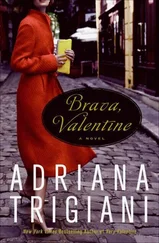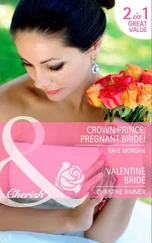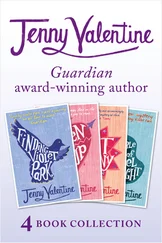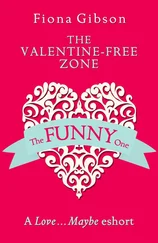As my family discusses their travel plans to the wedding, what airport, which rental car company, how many hotel rooms we’ll book at the Spolti Inn, my sisters imagine what they’ll wear, how their husbands will take time off from work, and my mother, perplexed, wonders how she’ll find a good caterer and wedding florist in the hilltop Tuscan town, we eat our Thanksgiving dinner.
Alfred hands the magazine to me. “A lucky reprieve,” he says quietly.
“As long as I make the payments on this place, you cannot close me down,” I say pleasantly and firmly. I don’t engage in the petty anger anymore. I don’t have the energy to fight with my brother and take over the operation of the shoe company. Alfred, of course, does not respond. He knows that the woman I was a year ago has been replaced by an eight-hundred-pound gorilla with a business plan. We’re not done wrangling, but at least he knows where I stand. For now.
My sisters help me do the dishes and clean up the kitchen while the men watch football. This is the last family Thanksgiving on Perry Street. This time next year, Gram will be living with her new husband in his home over the tannery.
I pack up leftovers for everyone to take home. Gabriel takes the last of Roman’s cobbler, knowing it’s the last time he’ll ever get it without ordering it at Ca’ d’Oro. I send Gram up to bed to talk with Dominic on the phone. I’m thrilled to be alone at the end of a long day. I hear the key in the lock downstairs. My mother must have forgotten something. Then I hear a voice call softly to me from the stairwell, “Valentine?”
Roman enters the living room. I stand by the kitchen counter and look at him.
“How was the cobbler?” he asks.
“Delicious. I have your pan.” I hold it up.
“That’s why I came over here. The pan.” He smiles.
I look at him, drinking in the details of him, from the layers of his long hair down to his Wigwam socks. I look down at his feet, even in the mood to embrace his yellow plastic clogs, but tonight, he’s wearing real shoes, and they are (at long last!) a pair of Tod’s fine suede loafers. From this vantage point and at this moment in our history, I can’t believe we broke up. Isn’t that weird, how I want what I can’t have, and when I have it, I don’t understand it. “Do you always check up on girlfriends when you break up with them?”
“Only you.”
He comes to me, takes me in his arms, and kisses me on the cheek and then the neck. “I’m not over you,” he says.
“Roman, heat was never our problem.”
“I know.” He’s been thinking about us, too. And evidently, he’s come to some of the same conclusions I did. “There’s a lot of passion, Valentine.”
“Maybe we’ll stay friends, and then when we’re old, we’ll reconnect like Gram and Dominic and rent a Silverstream and travel around the country.”
“What a terrible idea,” Roman says. The way he says it makes me laugh. “You know, I think about the first time I saw you on the roof. And how I shouldn’t have looked, but I couldn’t help it. I didn’t want to help it. Sometimes I think back to that night when I didn’t know you, and how I imagined what you would be like if I was ever lucky enough to get to know you. And then I got to know you and you were so much better than the woman I imagined you to be. That’s when I fell in love with you. You exceeded my expectations, and even still, you surprise me like no other woman ever has. It’s strange. I know it’s over, but it can’t be for me.”
I hold Roman close. “I’m not going anywhere, but right now, I can’t be with you because you don’t deserve to be second, you should be first. I don’t want you to wait for me, but if, down the line, when things settle down, and you think of me,” I say, taking his face in my hands, “use the key.”
“It’s a deal,” he says.
Roman knows and I know that he will probably never use the key, that it will wind up in the bottom of his drawer, and someday, when he’s looking for something, he’ll find the key and remember what we meant to each other. But for now, he’ll keep it in his pocket, and when he needs to believe that there’s a possibility, he’ll take it out, look at it, and consider the trip across town to the West Village.
I remember the cobbler pan, and I tuck it under his arm. I watch as he goes. Then, as his footsteps fall on the stairs, I remember that I never made him a pair of boots as I promised. So many things I meant to do, so many things that went undone.
The sun glows behind the skyscrapers, like a tiger’s eye on this early December morning. The sky holds the light like it’s buried inside a gray wool coat. Gram and I stand on the corner of Fifth Avenue and Fifty-eighth Street, holding our paper cups of hot coffee, hers black, mine with cream and no sugar. Her emerald-cut diamond engagement ring sparkles against the blue columns on the Greek-diner coffee cup. Nice color composition.
Like two architects in ancient Rome, we squint before our masterpiece with cold, clinical eyes and take in every detail. I shift my weight from foot to foot as I study it. Gram takes a few steps back and tilts her head, slightly adjusting her point of view. We haven’t built a duomo, a cathedral, or even garden statuary, we’ve made wedding shoes, and here they are in Bergdorf’s holiday windows. Our entire line is represented. To see one hundred years of our shoes in the windows takes our breath away.
Delivery trucks rumble by, but we don’t pay them any mind. Jackhammers punctuate the din, reminding us that no matter what time of day or night in New York City, somebody somewhere on this island is making something. We stand for what seems to be a long time. “So. What do you think?” I finally ask.
“You know, for the longest time, your grandfather and I would argue about which was the better movie, Dr. Zhivago or The Way We Were. I voted for The Way We Were because it was about my group…but now”-she sips her coffee and then continues-“now, that I see these windows, and the drama in the details of the Russian style, I have to say I’m going to go with Dr. Zhivago.”
“Me, too,” I say, putting my arm around her shoulder.
These holiday windows are for grown-ups. A few blocks south, you can stand in line behind a red velvet rope at Saks Fifth Avenue or Lord & Taylor to view miniatures of enchanting Christmas villages for children. You’ll see snow-covered mountains trimmed in glitter, ice skaters pirouetting on mirrored lakes, and toy trains carrying tiny foil presents chuffing through the scenes.
Here at Bergdorf’s, though, you get none of the kitsch, and all of the cream. Here’s a sophisticated holiday tale of true love Russian style as dramatized by glamorous American brides. Rhedd Lewis’s wedding feast for the eyes begins in the side windows of West Fifty-seventh Street, wraps around the front of the store on Fifth Avenue, and concludes in the side windows on West Fifty-eighth Street.
As our eyes follow the action from the first window, we see full-size, gilded wooden horses pulling magnificently costumed brides standing on enameled chariots and baroque sleds, festooned with jewels. Upon closer inspection, you see that the modes of transportation are decorated with actual jewelry-cabochon-laden earrings, gold necklaces that drip with chunky gemstones, gleaming cuff bracelets, and enormous dome rings, the effect of which makes a resplendent mosaic.
Fabergé eggs are cracked open in the foreground, spilling forth loose diamonds and pearls on a bed of wedding rice. Antique books are strewn on the ground, while loose pages float through the air. Window to window the pages and words change-there’s Dr. Zhivago (of course), Anna Karenina, The Three Sisters, The Brothers Karamazov, and War and Peace, appropriate for a wedding(!).
Читать дальше
